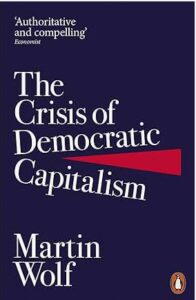My TV critic

I was the Observer’s TV critic for eight years, so I’ve done my tour of duty as a couch potato. Accordingly, I now watch very little TV, and this guy stands watching me accusingly whenever I succumb. In vain did I protest that I was only watching the rugby match between Ireland and England on Saturday. (Ireland lost by a whisper.)
Quote of the Day
“Start where you are. Use what you have. Do what you can.”
- Arthur Ashe
Good advice from a great tennis player. But actually it’s a motto that also applies to life generally.
Musical alternative to the morning’s radio news
Ennio Morricone | Man with a harmonica (Once upon a time in the West)
Extraordinary piece.
Thinking Aloud
This is an experiment. As I go about my various day jobs I often find myself thinking about something I’ve read or heard on the news but don’t have the time to write it. So the other day I took out my phone and dumped my momentary stream of consciousness into it. Not sure if it works, but I thought I’d give it a try. Here’s one from yesterday.
Long Read of the Day
Sharing the Tech Wealth
Terrific essay by my colleague, Diane Coyle.
TL;DR summary is: Big Tech firms flagrantly disregard the implicit social contract that enables capitalist economies to thrive. The time has come to curb their market power and establish the institutional mechanisms necessary to prevent the benefits of technological innovation from being monopolised by a privileged few.
But that’s just the summary. Do read the whole thing.
It’s hard to over-estimate the important of her argument. Democracy depends on a social contract with capitalism. Since the 1970s, that contract has been weakened and then broken (Martin Wolf link) by neoliberal ruling elites. And the tech companies, with their colossal profit margins, have been generating wealth at a rate — and on a scale — that John D. Rockefeller and his peers couldn’t even imagine. But none of this wealth is currently being shared. If this isn’t fixed, societal breakdown lies ahead, with predictable and ultimately catastrophic consequences for democracies.
Books, etc.
Martin Wolf and democracy’s ‘doom loop’

I’ve had this book for a while, but had only dipped into it. I’m now embarked on a proper reading because it covers territory of something I’m working on. The book is about the fragile, rocky marriage between liberal democracy and capitalism. Wolf’s fear is that capitalism is now undermining, perhaps destroying, the democracy that has in the past saved it from itself (just think of the way the banks were rescued in 2008). As Bill Emmott points out in his review of the book, “there is nothing new in worrying about democracy, nor about capitalism. But, to borrow a phrase from the 2011-12 euro sovereign debt crisis, Wolf’s fear is that this once productive pairing might now have trapped itself in a kind of doom loop”.
Wolf is a deeply serious man, who owes his existence to the fact that some of his Jewish ancestors were insightfully pessimistic and made their escape from the Continent before Hitler got to them. If he sees trouble ahead, then it’d be foolish not to pay attention to what’s happening all around us.
My commonplace booklet
The “Aha!” Moment
From Seth Godin:
The most effective persuasion happens when we persuade ourselves.
The purpose of the memo or the table or the graph or the presentation is to create the conditions for someone to make up their own minds. Because it’s almost impossible to make up their mind for them.
The aha is actually a chemical reaction, a rewiring of our brain, the moment when we see what we hadn’t seen before and make a new decision based on what we believe to be new information.
Linkblog
Something I noticed, while drinking from the Internet firehose.
Back to the bog
The conventional idea about offsetting carbon emissions involves planting trees. But a fascinating item in Andrew Curry’s unmissable blog makes the point that regenerating peat bogs is a much more efficient — and cheaper — alternative.
Errata
Tom Roper was prompted to write by my (mis)attribution of a quotation in Monday’s edition:
May I point out, though, that the expression ‘optimism of the will, pessimism of the intellect’, though used by Gramsci, was originally the formulation of Romain Rolland? See Francesca Antonini. (2022) Gramsci on Bureaucracy. Italian Culture 40:1, pages 16-26. for a discussion of this point.
Which nicely confirms my belief about the delights of being a blogger: often, your readers know more than you do :-)
This Blog is also available as an email three days a week. If you think that might suit you better, why not subscribe? One email on Mondays, Wednesdays and Fridays delivered to your inbox at 6am UK time. It’s free, and you can always unsubscribe if you conclude your inbox is full enough already!
